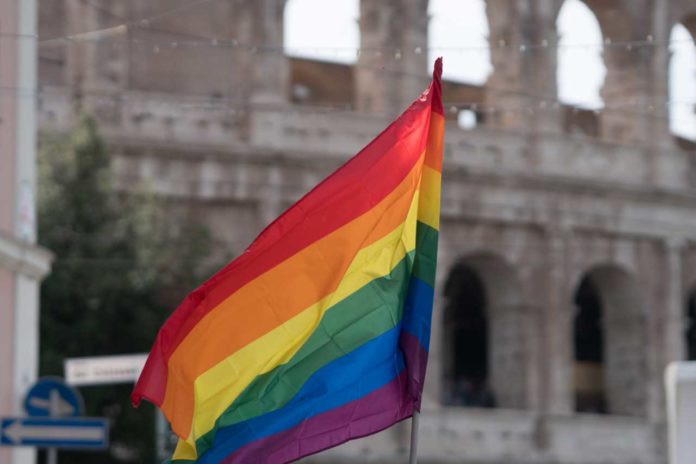Korean media’s focus on gay club in COVID-19 case further stigmatizes LGBT people
A 29-year-old South Korean man who tested positive for COVID-19 is thought to have exposed at least 1,500 people to the coronavirus after attending a series of bars and clubs in Itaewon, a club district in Seoul.
Headlines stated that the man had visited “gay clubs.”
Human rights activists were outraged that South Korean media outlets headlined that the bars and clubs the man visited were gay, asserting that media focus could incite anti-LGBT attacks.
“Revealing detailed personal information such as age, residence and occupation leads to outing the individual and promoting prejudice and hatred against sexual minorities,” an association of human rights groups formed in response to the COVID-19 pandemic said in a statement May 8.
The human rights groups said stigma and risks of being outed could push any person who came into contact with the confirmed patient further into hiding and fear seeking treatment.
On May 7, King Club, one of the clubs the man visited during his Saturday night out on May 2, posted a notice on its social media account saying the confirmed patient visited the club and the building had been disinfected and was safe for patrons. A local daily newspaper posted the story online, referring to the place as a “gay club” in its headline. Other news outlets picked up the story.
The government is conducting an epidemiological study in an effort to trace, test and isolate those who may have come into contact with the confirmed patient, who visited two convenience stores and five gay bars and clubs. More than a dozen people are confirmed infected so far.
Being gay is not illegal in South Korea, but sexual minorities face widespread social stigma, prejudice and discrimination. According to the latest Organization for Economic Cooperation and Development report published in 2019, Korea was fourth from the bottom in terms of LGBTQ inclusiveness among the member countries surveyed. It scored 2.8 points out of 10.
Germany bans conversion therapy
On May 11, Germany became the fifth country in the world to ban conversion therapy of LGBTQ minors. Conversion therapy is the pseudoscientific practice of trying to change an individual’s sexual orientation or gender identity using psychological or spiritual interventions. Under the ban, it is illegal to carry out conversion therapy on anyone under 18. The law also bans advertising conversion therapy and makes it illegal to force, trick or pressure an adult into conversion therapy.
A 2019 study by OutRight Action International reported that only a third of people who undergo conversion therapy seek it out themselves. Two-thirds say their family, faith group or others forced or pressured them into it.
The American Psychiatric Association and other international psychological and psychiatric organizations have stated that the practice can be dangerous, causing serious, long-term trauma.
Brazil’s Supreme Court overturned gay ban on donating blood
Brazil’s Supreme Court overturned rules that limit gay and bisexual men from donating blood in a decision considered a human rights victory for LGBTQ people in the country. After almost four years in court, seven of 11 Supreme Court justices voted on May 8 in favor of overthrowing guidelines that bar men who have sex with other men from giving blood for 12 months, ending any waiting time. The Supreme Court said the ban was unconstitutional as it imposed restrictions on gay and bisexual men, backing Supreme Court Minister Edson Fachin, who argued this “offended the basic human dignity of gay and bisexual men.”
Fachin said in his decision, “Instead of the state enabling these people to promote good by donating blood, it unduly restricts solidarity based on prejudice and discrimination.”
The decision comes after several nations have relaxed rules on blood donations in recent weeks as blood supplies have dwindled due to the coronavirus pandemic.
Many countries, including the U.S., introduced blood donation controls in the 1980s during the HIV/AIDS pandemic when infected blood contaminated supplies. Activists working to overturn the donation bans argued that individual assessments of risk for all potential blood donors would be both safer and fairer, with no stigma attached to any group.
Taiwanese LGBT group petitions to allow cross-national same-sex marriage
Volunteers from LGBT groups in Taiwan began a campaign on May 9 to garner 10,000 signatures to petition the government on laws that restrict same-sex marriage between couples from different countries.
The petition demands removal of restrictions so same-sex couples would have full marriage rights in Taiwan, according to the Taiwan Alliance to Promote Civil Partnership Rights (TAPCPR). The petition will be presented to the government on May 17, the first anniversary of the country’s legislation of same-sex marriage, the TAPCPR said.
Since the same-sex marriage law took effect May 24, 2019, more than 3,500 same-sex couples have registered their marriages in Taiwan as of May 1, according to Ministry of the Interior statistics.
But the law prohibits recognition of marriages where one partner is from a country where same-sex marriage is illegal. Same-sex couples should not have to face these legal hurdles since there are no such restrictions on cross-national heterosexual marriage, said TAPCPR.
The group is proposing an amendment to the law that would give same-sex couples the same marriage rights as heterosexual partners, regardless of their nationalities.
Update:
Gender-based lockdown rules in Bogotá, Colombia, will be lifted after they fueled a wave of police abuse and other violence against trans people. Bogotá Mayor Claudia Lopez said in a virtual press conference on May 8 that the rules, which have been in place for a month, would be lifted May 13. The rules established gender-based days for leaving the house, putting trans people whose ID and gender presentation didn’t match their allocated day at risk from police abuse and other violence.

